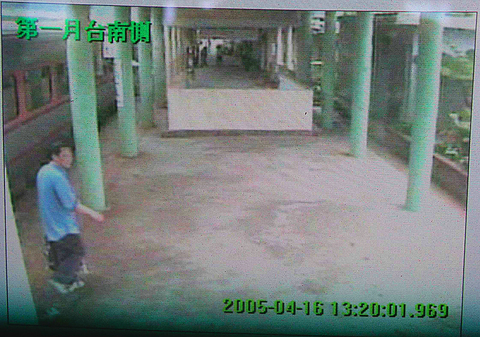Jay Chou (
Several years after the peak of F4's popularity in Taiwan, the four-piece boy band has found a new market in Japan, where the release of Meteor Shower (流星雨) took the band into the top 10 on Japan's main pop chart, marking a first for a Taiwanese band. Previously, the only non-Japanese to make it onto the country's pop chart were Jackie Chan (成龍) and three South Korean singers, all of whom sung in Japanese. F4's album is entirely in Mandarin and still squeezed its way into the No. 10 spot. Whatever's hot in Japan eventually makes its way to Taiwan, so could F4's success there portend a strong comeback at home? Watch for it this summer.
China's hottest export, Zhang Ziyi (

PHOTO: TAIPEI TIMES
The entertainment world suffered a grievous loss this week when one of the greatest Taiwanese comedians and actors, Ni Min-jan (
According to Ni's friends, the legendary veteran comedian had been greatly agitated by recent financial and family problems and suffered severe depression without realizing it.
Ni's second wife, Lee Li-hua (

PHOTO: TAIPEI TIMES
Since Ni's 83-year-old mom has been hospitalized for cancer treatment, the family thought the news would be too much for her and decided to lie about Ni's death as long as they could. One of Ni's best friends, Yu Tien (
On a much happier note, Taiwanese beauty Chen Xiao-xuan (陳孝萱) recently confirmed the good news of her pregnancy after dodging rumors and questions for weeks. She and her metrosexual boyfriend Zhan
Ren-xiong (

PHOTO: TAIPEI TIMES

That US assistance was a model for Taiwan’s spectacular development success was early recognized by policymakers and analysts. In a report to the US Congress for the fiscal year 1962, former President John F. Kennedy noted Taiwan’s “rapid economic growth,” was “producing a substantial net gain in living.” Kennedy had a stake in Taiwan’s achievements and the US’ official development assistance (ODA) in general: In September 1961, his entreaty to make the 1960s a “decade of development,” and an accompanying proposal for dedicated legislation to this end, had been formalized by congressional passage of the Foreign Assistance Act. Two

March 31 to April 6 On May 13, 1950, National Taiwan University Hospital otolaryngologist Su You-peng (蘇友鵬) was summoned to the director’s office. He thought someone had complained about him practicing the violin at night, but when he entered the room, he knew something was terribly wrong. He saw several burly men who appeared to be government secret agents, and three other resident doctors: internist Hsu Chiang (許強), dermatologist Hu Pao-chen (胡寶珍) and ophthalmologist Hu Hsin-lin (胡鑫麟). They were handcuffed, herded onto two jeeps and taken to the Secrecy Bureau (保密局) for questioning. Su was still in his doctor’s robes at

Last week the Democratic Progressive Party (DPP) said that the budget cuts voted for by the China-aligned parties in the legislature, are intended to force the DPP to hike electricity rates. The public would then blame it for the rate hike. It’s fairly clear that the first part of that is correct. Slashing the budget of state-run Taiwan Power Co (Taipower, 台電) is a move intended to cause discontent with the DPP when electricity rates go up. Taipower’s debt, NT$422.9 billion (US$12.78 billion), is one of the numerous permanent crises created by the nation’s construction-industrial state and the developmentalist mentality it

Experts say that the devastating earthquake in Myanmar on Friday was likely the strongest to hit the country in decades, with disaster modeling suggesting thousands could be dead. Automatic assessments from the US Geological Survey (USGS) said the shallow 7.7-magnitude quake northwest of the central Myanmar city of Sagaing triggered a red alert for shaking-related fatalities and economic losses. “High casualties and extensive damage are probable and the disaster is likely widespread,” it said, locating the epicentre near the central Myanmar city of Mandalay, home to more than a million people. Myanmar’s ruling junta said on Saturday morning that the number killed had